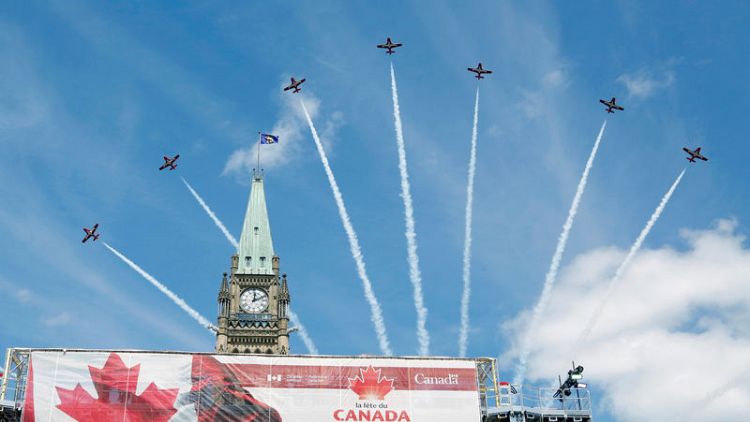By Fergal Smith
TORONTO (Reuters) - Canada's candidates are making a range of pricey campaign promises ahead of October's vote, but a former central bank governor and ratings agencies see wiggle room for a larger budget shortfall so long as the economy continues to grow.
Because of economic growth, the deficit could climb to about C$30 billion over the next election cycle without increasing debt as a share of gross domestic product, the government's preferred fiscal anchor, according to Reuters calculations.
The March federal budget projected that nominal GDP growth would slow to 3.4% this year but then climb steadily to 4% in 2023.
A deficit of as much as C$30 billion "would not generate unmanageable debt service charges," said David Dodge, senior advisor at Bennett Jones and former Governor of the Bank of Canada. "If interest rates go down further you have a little bit more room."
Liberal Prime Minister Justin Trudeau is banking on it. His promises ahead of the Oct. 21 federal election would raise the deficit to C$27.4 billion in the first year, Trudeau said on Sunday, with debt as a percentage of output remaining on a downward trajectory.
On Monday, financial markets were unfazed by the potential deficit increase. The Canadian dollar was the second strongest performing G10 currency, after sterling, while the gap between Canada's 10-year yield and its U.S. equivalent was unchanged at a spread of 31.5 basis points in favour of the U.S. bond.
Conservative Party leader Andrew Scheer on Monday criticized Trudeau's plan, saying it was reckless and would lead to "massive tax hikes", but he is in no hurry to balance the budget either. Scheer says he'll close the budget gap in five years if elected.
Trudeau and Scheer are running in a tight race, with a Nanos poll published on Monday putting the Conservatives at 34% nationally compared with 32.7% for the Liberals.
Canada is one of a few countries with an undisputed triple A credit rating. At less than 31%, its federal debt-to-GDP ratio is low compared to some G7 peers, while its borrowing costs are lower than for the United States.
The Government of Canada 10-year yield was 1.37% on Monday.
"It is ultimately about the sustainability of public debt and as long as the economy is growing then it is not necessary to balance the budget in order to have public debt on a sustainable path," said Charles Seville, a senior director at Fitch Ratings.
Canada's smaller parties have also made fiscal promises worth billions of dollars. Only 3.5% of Canadians say the debt or deficit is the top concern, according to pollster Nanos Research.
"At the time where there isn't the political will or will among the population or even consensus among economists that the government should be balancing the budget it would seem stupid to focus on that," said Stephen Brown, senior Canada economist at Capital Economics.
Additional government spending could relieve pressure on Canada's heavily-indebted households and help support the country's immigration-led growth.
"You should really be investing in providing the infrastructure for those people coming to the country. They need that for the next 60 years ... each year they will pay more taxes as they come," Brown said.
(Reporting by Fergal Smith, editing by Steve Scherer and David Gregorio)
